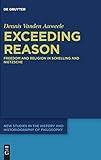Exceeding Reason : Freedom and Religion in Schelling and Nietzsche / Dennis Vanden Auweele.
Material type: TextSeries: New Studies in the History and Historiography of Philosophy ; 6Publisher: Berlin ; Boston : De Gruyter, [2020]Copyright date: ©2020Description: 1 online resource (XIII, 319 p.)Content type:
TextSeries: New Studies in the History and Historiography of Philosophy ; 6Publisher: Berlin ; Boston : De Gruyter, [2020]Copyright date: ©2020Description: 1 online resource (XIII, 319 p.)Content type: - 9783110617757
- 9783110618457
- 9783110618112
- online - DeGruyter
- Issued also in print.
| Item type | Current library | Call number | URL | Status | Notes | Barcode | |
|---|---|---|---|---|---|---|---|
 eBook
eBook
|
Biblioteca "Angelicum" Pont. Univ. S.Tommaso d'Aquino Nuvola online | online - DeGruyter (Browse shelf(Opens below)) | Online access | Not for loan (Accesso limitato) | Accesso per gli utenti autorizzati / Access for authorized users | (dgr)9783110618112 |
Frontmatter -- Acknowledgments -- Contents -- Abbreviations and Translation -- Introduction -- Chapter 1. Schelling and Nietzsche: A Philosophical Discussion? -- Part I: Dualism, Rationalism and Cultural Fatigue -- Chapter 2. Excessive Rationalism -- Chapter 3. Goodness, Evil and the Tradition -- Chapter 4. Mythology, Religion and Identity -- Part II: Organicism, Freedom and Self-Formation -- Chapter 5. Living Nature and Freedom in Schelling -- Chapter 6. Culture, Style and Sovereignty in Nietzsche -- Part III: Mythology, Revelation and Religion -- Chapter 7. Making Way for Revelation in Schelling’s Spätphilosophie -- Chapter 8. The Revealed: On Myth, Monotheism and Philosophical Religion -- Chapter 9. Nietzsche’s Religion of a Brave New Future -- Conclusion -- Bibliography -- Index -- Endorsements
restricted access online access with authorization star
http://purl.org/coar/access_right/c_16ec
The work of the later Schelling (in and after 1809) seems antithetical to that of Nietzsche: one a Romantic, idealist and Christian, the other Dionysian, anti-idealist and anti-Christian. Still, there is a very meaningful and educative dialogue to be found between Schelling and Nietzsche on the topics of reason, freedom and religion. Both of them start their philosophy with a similar critique of the Western tradition, which to them is overly dualist, rationalist and anti-organic (metaphysically, ethically, religiously, politically). In response, they hope to inculcate a more lively view of reality in which a new understanding of freedom takes center stage. This freedom can be revealed and strengthened through a proper approach to religion, one that neither disconnects from nor subordinates religion to reason. Religion is the dialogical other to reason, one that refreshes and animates our attempts to navigate the world autonomously. In doing so, Schelling and Nietzsche open up new avenues of thinking about (the relationship between) freedom, reason and religion.
Issued also in print.
Mode of access: Internet via World Wide Web.
In English.
Description based on online resource; title from PDF title page (publisher's Web site, viewed 28. Feb 2023)


